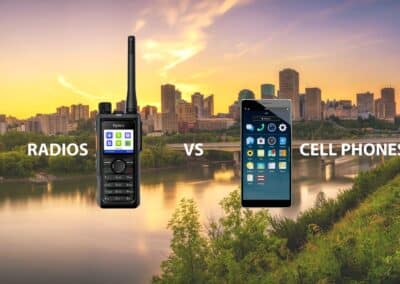Best Practices for Two-Way Radio Communications
A two-way radio is a critical communications tool in a variety of industries, so it is important to ensure your employees know how to talk using two-way radios.
Basic training can make the difference between efficient and timely communications and a complete communications breakdown. Here are some tips on how to ensure everyone on your team can effectively communicate using two-way radios.
Prepare Before You Speak
- Identify yourself before you talk – memorize call signs and use yours before speaking
- Take a moment to think about what you are going to say before you say it. Would you understand your own instructions?
- Try and consider the most concise, straightforward way of explaining things before you throw complex instructions at your team via radio
Speak Clearly and Slowly
- Be aware of the volume of your voice and speak as clearly as you can
- Speak a little louder when you are outdoors in noisy situations
- If you speak too quickly, then others will not understand you because they don’t have the time to digest what you are saying
- Remember people often speak quickly in stressful situations, so take a deep breath before your call and clearly say what you are trying to communicate
If someone does not understand a word, or is confused by a homonym (like way and weigh) use the Phonetic Alphabet to spell out the word
Keep it Short and Simple
- Avoid information overload and long complicated sentences
- Rather than delivering everything all at once, break instructions down into simple messages so that they can be easily understood
- If you have multiple things to cover, speak one point then say ‘break’, wait a couple of seconds then speak the next point and again say ‘break’ – this allows the other party to speak or ask for clarification. Learn more about Radio Lingo
- Stay on topic and keep your radio conversations short, concise, and related to the business at hand. Gossip and small talk blocks channels for other radio users
- Say ‘over’ to indicate you are finished so the other party know they can speak or reply
- Terminate the call by saying ‘out’
Make Sure You Are Understood
- A simple ‘do you copy?’ can establish whether someone has understood what you have said to them
- Sometimes people will not let you know that they do not understand what you are saying
- If they don’t sound like they have understood your instructions, it’s worth taking the time to explain it to them again.
Do Not Interrupt
- If someone is in the middle of speaking, do not try to transmit and interrupt them
- Always wait until people have finished their transmission before responding to ensure clear communication for all parties
Properly Train Staff
- If you are investing in two-way radios for your staff, it is worth taking the time to give them comprehensive training on how to use them
- Train your staff on radio communications best practices, on radio terminology and possible radio codes you use in your business, how to care for and charge radios, and how to use safety features like emergency calling and man down, and how to use radio channels and zones
Perform Regular Radio Checks
- Before going on duty, ensure your radio battery is charged and power is on
- Keep volume high enough to hear calls
- Make regular radio checks to ensure everything is working and you are still in range
- Call a radio and say, “Radio Check”, if you receive a radio check and you can hear it clearly, reply “Read you loud and clear”
Don’t Assume All Conversations Are Private
- Don’t transmit sensitive or confidential information – you may be using a shared channel
- Don’t reveal sensitive information or talk about things that are overly personal via your radio
- If private calls and secure information are vital to your business, make sure your radio is equipped with advanced over-the-air encryption
Please contact us if you have any questions about Hytera two-way radios.



